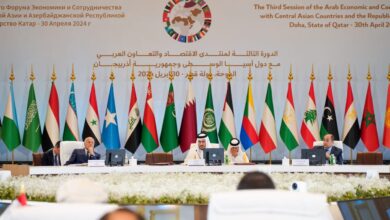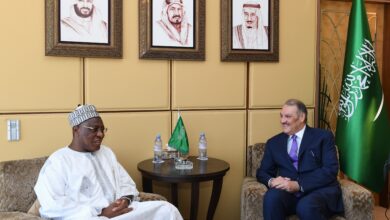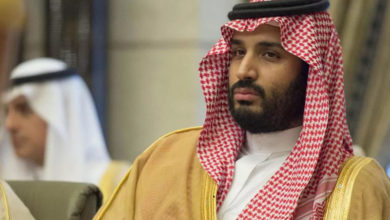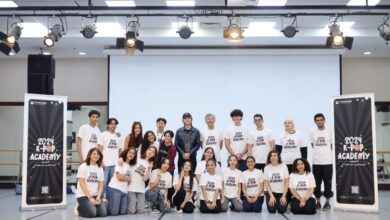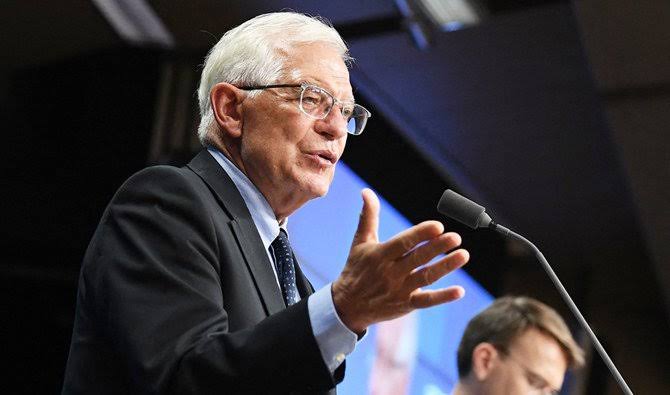
archive..
Ashraf AboArafe
Thank you, Minister of Foreign Affairs of Egypt, Sameh Shoukry, thank you very much for your warm welcome and your hospitality.
I know that you are coming back from a travel to Kyiv and Moscow, which is not the easiest travel that you could do. And I thank you again for having the time to have this long meeting, in which we have been talking a lot about a lot of issues, on bilateral relations and the world around us, regional and global issues.
This is my second time in Cairo in my current capacity as the European Union High Representative for Foreign Affairs and Security Policy, and to tell the truth I have stopped counting how many times we have met bilaterally and how many phone calls we have had in these three and a half years, we have had a lot. A dense, interesting, frank, honest and positive cooperation.
Tomorrow, I will have the opportunity to meet also with President of Egypt, Abdel Fattah Al-Sisi. Today with Minister of Defence of Egypt, Mohamed Zaki, I met also with the Secretary-General of the League of Arab States Ahmed Aboul Gheit. I think that this short, intense visit to Egypt has been very much profitable for our common understanding and facing together the challenges of this complex and difficult world.
First about our bilateral relations, allow me to say clearly and loudly that the bilateral relations with Egypt are of strategic importance for the European Union – they are good, but they can be improved. They have been growing, they have to continue [growing]. Today, we exchanged views on how to further broaden and deepen our very good cooperation.
Let’s start, for example, with energy. On energy, we consider Egypt a trusted, reliable partner. We want to continue working with you, also as host of the COP27 last year, to accelerate the clean energy transition and to help us in order to overcome the difficulties that the war in Ukraine has created to our energy mix.
On economic and trade, we stand ready to upgrade the already existing trade agreement, we are working closely with Egypt enhancing bilateral trade and investment. Some of the projects of our Global Gateway Initiative will be very important for the Egyptian economy and we are ready to call for a conference between the European Union and Egypt in order to boost the European investment in the country.
Also, in a positive manner, we have confirmed that we will go deeper in a political dialogue on human rights.
On our regional issues, let’s start with Sudan – I know how important is Sudan for Egypt. You have been hosting more than 200,000 Sudanese refugees during this crisis. On previous crises you already had a lot, but in very few days, more than 200,000 people have been hosted in Egypt, and I have to thank you for that.
Also, the European Union will provide an immediate assistance of €20 million to help you address this new wave of Sudanese refugees on your Southern border. I know this is not enough and you are going to pay much more, but at least, let us contribute a little bit in your support. I want to stress my gratitude to you Minister [of Foreign Affairs of Egypt, Sameh Hassan Shoukry] and to the Egyptian people for the generosity they have been showing towards the Sudanese refugees fleeing the conflict.
We believe that an inclusive mediation process under a strong African leadership should comprise all relevant stakeholders. It is not needed to say that Egypt is one of the most important stakeholders on the Sudanese case. We welcome the ceasefire, and we encourage Egypt to continue working to look for a peaceful solution to this conflict. We appreciate a lot your work, and we first, recognise that you are such an important stakeholder that nothing can be solved without you, and secondly, to encourage you to continue working on this very difficult issue.
On migration, we have seen last week the horrors of the shipwreck off the Greek coast. This demonstrates clearly that we need to double down on our efforts to put in place a sustainable, humane, and safe system of migration. This is a global issue that cannot be addressed by one country, or a region alone. We need to work together, as we do with Egypt, with countries of origin, transit and destination – as we do with Egypt – in order to avoid this drama from happening again. And we need to take fierce action against the smugglers and traffickers, who put people’s lives in danger knowing the risks that they are going to take. And we need to do it quickly. We cannot sit by when children are drowning in the Mediterranean Sea, a sea, that unites our continents.
Therefore, we are allocating to Egypt about €80 million for border management, search and rescue and anti-smuggling operations. Once again, we know that this is not enough, and that you are paying much more than that, and that you are hosting a community of migrants in Egypt which is about 10% of your population. So, you are not a country of transit you are hosting a lot of migrants, but we want to work together, in order to protect the boarders and to fight against these smugglers and traffickers that at the end are responsible for the people losing their lives in the sea or in the Sahara Desert.
We have opened a new chapter in our security cooperation by co-chairing the Global Counterterrorism Forum. Africa will be our strategic regional priority during our time in office of this co-chairmanship, because in Africa, the counterterrorism needs to be developed quickly and better because we see how the terrorists’ activities go south from the Horn of Africa, from Somalia. And we see how terrorists’ activities have been developing in the Sahel and going down to the Gulf of Guinea. We have to work together against that.
We also exchanged views about the Middle East Peace Process, on Libya, Syria, the Horn of Africa, on the Grand Ethiopian Renaissance Dam. I cannot summarise what we have been talking about, but we want to work together on all that, and I recognise the strong concerns that the water puts for Egypt. Egypt has been growing and living along the Nile, and everything that touches the water of the Nile is of extraordinary importance for Egypt, and we recognise this importance. We will do everything in order to safeguard your interests.
Certainly, we talked about the Russian aggression against Ukraine. A war that started by Russia’s illegal invasion of a sovereign nation and continues. This war has consequences not only for Ukraine, not only for Europe, but for everyone in the world, including Egypt. A lot of wheat consumed by the Egyptians comes from Ukraine and Russia – the food crisis here in the country is a direct consequence of this illegal invasion of Ukraine. We see how the war continues with destruction of civilian infrastructures and losses of civilian lives.
Now, some ask for peace, you ask for peace; believe me, we all wish peace. At least you and me, we want peace. Do you know who wants peace more than anyone else? The Ukrainians; the Ukrainians want peace more than anyone else, because they are suffering the most.
But this depends on the attitude of the aggressor. I know that a group of African leaders, including an important delegation from Egypt visited Kyiv, visited Moscow, and I am very much looking forward to continuing having more information about this visit, because I know that you want peace, and we have to work together in order to make a just and fair peace as soon as possible, with full respect of the sovereignty and territorial integrity of Ukraine.
Minister, dear friend, thank you again for your hospitality and for our important discussions. I am looking forward to continuing working closely together with Egypt. My best wishes for you and your great nation.
Q&A
Q. [In Arabic – English interpretation] In the past few years, we had momentum when it comes to the relations between Europe and Egypt. Are there more details regarding such a momentum in the relations between the European Union and Egypt?
As I said, I think that our relation has been improving in the last years. Yes, there have been moments in which we disagreed on some concrete issues, but frankly speaking I think that our relations and our cooperation with Egypt in all fields – migration, energy, security, counterterrorism, regional issues, Middle East Peace process, Sudan, Ethiopia – I do not see any subject in which we have not improved. I am sure we will continue improving.
Q. [In Arabic – English interpretation] During the past few months, the Palestinian territories witnessed escalations against Palestinians, especially that we have some Israeli politician. Could you tell us what is the strategy of the European Union to decrease the escalation between both fights and how to push for two states solution in the upcoming few months?
For the European Union, things are clear. The only way to end the conflict between Israel and Palestine is the Two-States solution, negotiated between the parties. Israel is making peace with some Arab states – normalisations of relations, and that is good. But one thing is to make peace with the Arab states and another thing is to make peace with Palestinians, that should not be forgotten.
This peace, for us, has to be built on the basis of Two States, living side by side in peace and security and in good relations with their neighbours. This will not fall from heaven, it will not grow on the trees, it will come from negotiations. Negotiations are stalled; in a complete stalemate, we have to try to resume them. The ongoing upsurge in violence only confirms this need. We are concerned by the spiraling of violence, and we have been consistently advocating for measures of de-escalation such as the lates meeting in Aqaba in Sharm el-Sheik. There you did a good job. Unhappily then, it was not fully implemented, the least I can say.
I commend the efforts of Egypt, the United States and Jordan to de-escalate and support these meetings. From our side, we are working in order to try during the next United Nations General Assembly to relaunch the work that we started last year in order to revive the process of looking for peace. And for that, certainly, we need Egypt. Egypt has an indispensable role in the Middle East Peace Process. Whenever the peace process starts again, Egypt will have to be onboard. I use this opportunity to appreciate the important role that Egypt is playing in the stabilisation and reconstruction of Gaza and the continuous efforts towards the Palestinian reconciliation.

